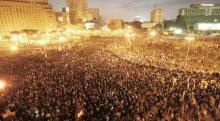For over a month now, several nations in Africa and the Middle East have been experiencing an unprecedented period of unrest in the form of popular demonstrations against those nations' governments, some of them escalating to full-scale revolution. This wave began as peaceful protests in Tunisia and echoed to nearby Egypt where the people, with the support of their military, ousted long-time president Hosni Mubarak and are now in the process of re-ordering their country under the promise of improved human rights, public representation and personal freedom. Other nations have seen more turmoil and violence in their own call for change. For the past several days, the country of Libya has been on the brink of civil war, elements of its own military defecting in protest against orders of assault against civilians.
Because the countries experiencing this transformative period are predominantly Muslim and several of them have been openly hostile to Jews and to Israel for some time now, the question of if and how Jews should support the revolutions is complex.
The biggest concern Jews all over the world have had about the new governments emerging from these revolutions is that they may be more hostile to Jews and the concept of the Jewish state than the regimes of the past. Specifically in Egypt, a country that has been at peace with Israel and has not exhibited any specific antisemitism of late, the recent revolution had a strong presence from The Muslim Brotherhood, an international religious and political organization that, put simply, aims to install Quranic law as state law in the nations where it operates. It should be noted that The Muslim Brotherhood, especially its mainstream majority, is not antisemitic. Some of its goals and policies, such the reinstitution of the poll tax against non-Muslims and the reclamation of "stolen lands" from non-Muslim peoples, certainly don't support the existence of Israel or the equal treatment of Jews in countries like Egypt.
But the popular demonstrations throughout the Middle East and North Africa are not specifically Islamist movements. There is a significant voice in the secular community, centered mostly around the various youth elements in the protests, that is mostly concerned with increased representation in their governments and improved personal freedoms. These are educated, tech-savvy and equality-driven movements. While it may be difficult for Jews to support the idea of a political force that clearly does not see them as equals and in some cases sees them as the enemy, there is no question that Jews should stand behind a congregation of people who simply wish to be free and receive fair treatment. There is no ambiguity in Jewish philosophy about innocents suffering for the ambitions of destructive people around them.
Regardless of what new policies emerge from these revolutionary days, it is naive to approach the demonstrations without acknowledging the inevitability of violence in them. Even in Egypt, where the de-seating of Hosni Mubarak was bloodless, there were clashes in the streets between protesters and Mubarak's supporters. In places like Libya and Bahrain, bloodshed has already become a regular part of the process. It is a terrible thing to witness war and an absolute sin to pray for it, but when war is a reality the only truly Jewish thing to do is support the healers and peacemakers. Should there be a call from institutions such as Doctors Without Boarders for donations to relieve those hurt and displaced by the fighting in the Middle East and North Africa, please consider acts of tzedakah through them.
